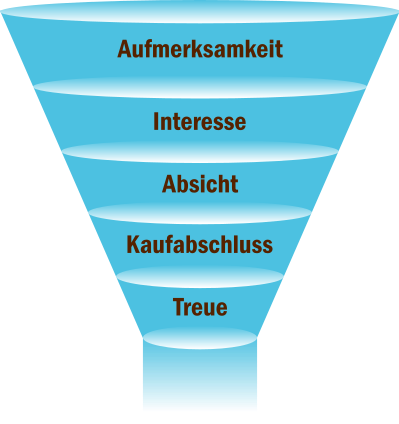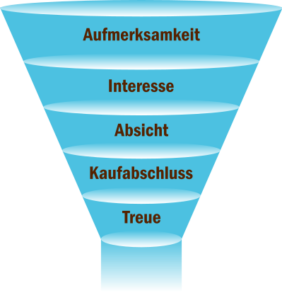Funnel marketing refers to the marketing funnel or conversion funnel or sales funnel, which in turn is a symbol of the complex marketing process. So there is some conceptual chaos in this area, but all terms actually mean the same thing.
The term funnel only became popular among online marketers in the early 2010s as a consequence of the mobile user experience and thus the more complex customer journey . It goes back to the much older concept of the “purchase funnel” from 1898. 1
Funnel marketing as a marketing discipline
Contents
The marketing funnel is used in online marketing to shape the customer journey, i.e. to lead the customer step by step to sales (the conversion). Customers in the funnel go through different phases of their personal customer journey.
In online marketing, it is important to identify the touch points along the marketing funnel and, if necessary, to establish them yourself. The funnel is therefore optimally modeled on the basis of a target group analysis and can then ensure the best possible cross-channel and cross-media user experience for the target group.
The stages of the marketing funnel
- Attention (Awareness)
- Discover (Discovery)
- Gewöhnen (Familiarity)
- Interesse (Interest)
- Consideration
- Desirability (Desire)
- Intent
- Weighing up (evaluation)
- Entscheidung (Decision)
- Purchase
- Additional and cross-selling (upsell / cross-selling)
- Customer satisfaction
- Loyalty
- Strengthening the customer relationship (retention)
- Rate and Recommend (Refer)
Marketing channels in the online marketing funnel
In online marketing, the phases of the marketing funnel are primarily mapped with Internet means. These can be roughly summarized in Search, Display, Social and Direct. The further down the funnel the potential customer is, the more direct and personal the communication becomes. At the same time, top-down communication is becoming more and more product-related.
This results in the choice of means, whereby it is true that campaigns from upper phases also pay into lower phases:
- Attention / Awareness
- Information is disseminated to a broad target group
- the target group discovers the brand and the need
- potential new customers get used to the brand
- Reach campaigns: SEO, SEM/SEA, social media marketing, print/TV, PR
- Interesse / Interest
- the need manifests itself in the target group
- Desire is aroused
- qualified leads (e.g. newsletter registrations) are generated
- Content marketing, influencer marketing, email marketing
- Intention / Intent
- the intention to buy is imminent
- Obstacles are eliminated
- Benefits are communicated
- PIM (Product Data Optimization), Support, Coupon Marketing
- Kaufschluss /Purchase
- The first conversion takes place
- Additional and cross-selling increase the value of the shopping cart
- Increasing customer satisfaction
- Evaluation management, after-sales support
- Treue / Loyalty
- Brand loyalty is highly emotional
- Satisfied customers become brand ambassadors
- Regular customer benefits
The phases all work for each other. For example, it is possible and desirable for a target person to get involved in the intention phase, thereby developing awareness in order to rethink his purchase decision in favor of the advertiser. This must be taken into account, especially when evaluating the funnel . A particular challenge for online marketing managers in funnel marketing is therefore the attribution of channels and phases.
Funnel marketing is a cyclical process. It is critical to continuously monitor, analyze and optimize this process. The choice of means in the 5 phases is also changing rapidly, which is why marketing funnels look completely different today than they did a few years ago.
Frequently asked questions about marketing funnels
What is a funnel?
Funnel is the English word for funnel. A funnel is wide at the top and tapers further down. It helps to transfer pourable and pourable materials without losses. This real-world feature describes quite well what a marketing funnel does:
A marketing funnel collects potential buyers and leads them towards the conclusion of the purchase (the “conversion”).
A bad marketing funnel leaves gaps open from which customers escape. A good marketing funnel leads customers seamlessly to the conclusion of the purchase.
What other names for marketing funnels are there?
Marketing funnel is a made-up word. There is no perfect marketing funnel definition, but there are various synonyms and clarifications. The most common synonyms for marketing funnel are:
- Conversion funnel: the funnel leads potential new customers to the conversion.
- Sales funnel: the funnel ensures sales. In German, the sales funnel is called a sales funnel . (Sales)
- Purchase funnel: at the end of the funnel you buy. The direct translation is buy funnel. (buy, engl. purchase)
The following clarifications are also very common:
- Online Marketing Funnel (also: Digital Marketing Funnel):
The digital offshoot of funnel marketing. Here, the entire customer acquisition is reduced to online contacts (online touchpoints). - E-Commerce Funnel:
In this concept of the marketing funnel, the highest value is placed on online sales. As a rule, the ultimate goal of the e-commerce funnel is the check-out of an online shop. However, after-sales is also becoming increasingly important in e-commerce in order to refill the e-commerce funnel from one’s own inventory (existing customers, regular customers). For this purpose, the need for consumables or similar products is reawakened after the purchase has been completed. - Content Marketing Funnel:
Content marketing is used to generate more reach and thus further open the funnel of the marketing funnel. The content marketing funnel takes into account the information needs of potential buyers.
What is funnel management?
Funnel management deals with managing the marketing funnel. The goal of funnel management is to optimize the individual stages of the funnel. For this purpose, contacts and their path through the marketing funnel are analyzed and measures for effective management are derived from them.
At each touchpoint, a funnel manager will critically question why a particular cohort has reached this point and what can cause the transaction to move to the next stage of the funnel.
Online marketing agencies that specialize in funnel management of online shops also refer to themselves as e-commerce agencies.
Referenzen
- Wikipedia: Purchase Funnel

